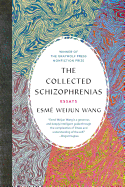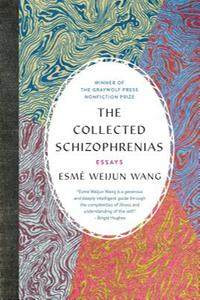
 Esmé Weijun Wang, author of the novel The Border of Paradise, was diagnosed with bipolar-type schizoaffective disorder in 2013. This diagnosis, which replaced her longtime diagnosis of bipolar disorder, explained the periodic symptoms of psychosis, such as hallucinations and delusions, that she first began experiencing years before as a student at Yale. Wang found some comfort in her diagnosis (it provided "a framework--a community, a lineage"). She also understood--from her own experience and from her years working as a lab researcher at Stanford--that its diagnostic criteria are inadequate in capturing the complexity, contradictions and the lived experience of schizoaffective disorder or another of "the schizophrenias."
Esmé Weijun Wang, author of the novel The Border of Paradise, was diagnosed with bipolar-type schizoaffective disorder in 2013. This diagnosis, which replaced her longtime diagnosis of bipolar disorder, explained the periodic symptoms of psychosis, such as hallucinations and delusions, that she first began experiencing years before as a student at Yale. Wang found some comfort in her diagnosis (it provided "a framework--a community, a lineage"). She also understood--from her own experience and from her years working as a lab researcher at Stanford--that its diagnostic criteria are inadequate in capturing the complexity, contradictions and the lived experience of schizoaffective disorder or another of "the schizophrenias."
"To read the DSM-5 definition of my felt experience is to be cast far from the horror of psychosis and unbridled mood; it shrink-wraps the bloody circumstance with objectivity until the words are colorless," Wang writes.
The Collected Schizophrenias is Wang's attempt to do what the DSM-5--the "clinical bible" of mental disorders--cannot. In 13 remarkably well-researched, intimately detailed essays, Wang guides readers on a tour of her own psychological and emotional terrain, grounded in the clinical and cultural context that has shaped it.
The essays range from the investigative to the meditative to the confessional--most of them all three at once. She examines the connections between mental illness, creativity, spirituality and the occult without resorting to romanticizing or cliché. She discusses her ambivalence about using her style and education to differentiate herself from others with her diagnosis. She illuminates the failures of the higher education system and the medical establishment properly to care for mentally ill people, drawing on her own traumatic experiences of stigmatization and involuntary hospitalization. And she discusses her complex feelings about heredity, fertility and motherhood in "The Choice of Children," a particularly affecting essay about her experience as a counselor at a camp for children with bipolar disorder.
Though Wang writes from a highly educated, keenly analytical point of view, there is no academic distance or coldness between her and the page. In fact, some of the essays--like "Perdition Days," about her experience of a rare and terrifying delusion--are so vivid and intensely personal they are difficult to read.
Near the end of the collection, after recounting the frustrations of dealing with her compounding diagnoses of PTSD and Lyme disease, Wang says that she is mostly stable these days, though she doesn't think she'll ever be free of "the schizophrenias."
"They have been with me too long, I think, to be obliterated, unlike these more recent ailments, which feel like part of the wrong narrative, and make me wonder how many different types of sick girl I can be," she writes.
Wang's search for unity may be elusive. She is many different types of "sick girl," and there are many different "schizophrenias"--but her essay collection organizes the confusion, terror and complexity of her experience into an imperfectly cohesive, profoundly illuminating whole. --Hannah Calkins, writer and editor in Washington, D.C.
Shelf Talker: In 13 well-researched and moving essays, a deeply insightful and empathetic writer attempts to make sense of her diagnosis of schizoaffective disorder.

